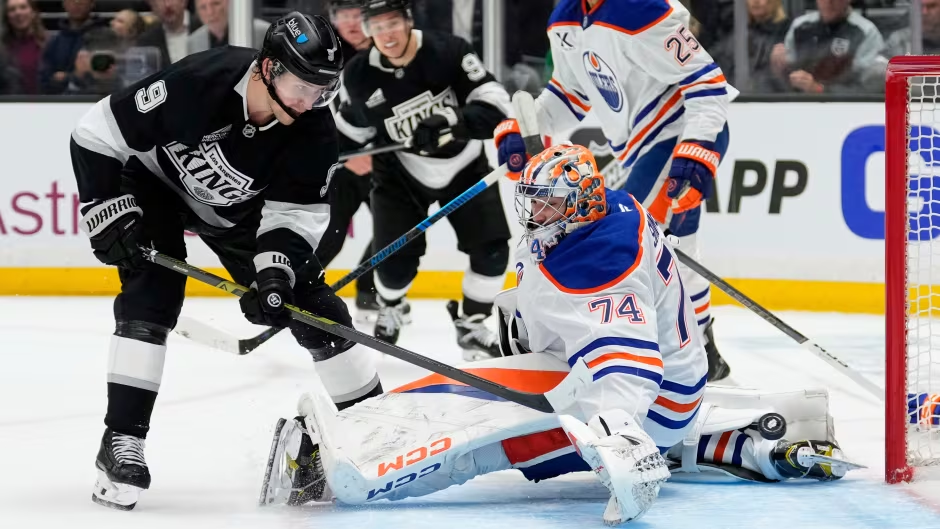
The Edmonton Oilers’ double masterstroke failed to materialize; the Los Angeles Kings defeated them by a score of six.
The Edmonton Oilers came into this pivotal matchup with high hopes and a strategy that many believed would turn the tides in their favor. This particular game was touted as one where the Oilers’ “double masterstroke” — a combination of aggressive offensive play and a more disciplined defensive system — would pay dividends. But instead of securing a vital win against a fierce Los Angeles Kings team, the Oilers found themselves on the wrong end of a six-goal defeat. The Kings dominated the game with a final scoreline that belied the expectations set for the Oilers, leaving fans and analysts alike questioning what went wrong for Edmonton.
This article will break down the key moments of the game, analyze the decisions made by the Oilers coaching staff and players, and reflect on how the Kings exploited the Oilers’ weaknesses. We’ll explore the tactical errors, the missed opportunities, and the overall lack of execution that led to one of the most disappointing losses of the Oilers’ season.
Heading into this game, Edmonton had devised a two-pronged strategy to overcome a talented but inconsistent Los Angeles Kings squad. The first part of the “double masterstroke” was an intensified offensive push, built around the Oilers’ high-powered top line, featuring Connor McDavid and Leon Draisaitl. The aim was clear: dominate possession and capitalize on the offensive zone time to overwhelm the Kings’ defense. Edmonton’s power play, one of the best in the league, was expected to be a crucial weapon.
The second part of the plan was a defensive adjustment. Historically, the Oilers have been known for their explosive attack, but defensive issues often plague their game. This time, the coaching staff had worked on tightening up the defensive zone coverage and emphasizing better puck management in all three zones. By improving their discipline and commitment to defensive systems, the Oilers hoped to limit the Kings’ counterattacks and high-danger chances.
In theory, this “double masterstroke” — offensive dominance combined with improved defensive responsibility — was supposed to carry the Oilers to victory. However, as the final scoreline showed, the execution was far from perfect.
The Oilers entered the first period looking solid. They won several key faceoffs and had some strong offensive zone shifts, but the Kings were ready to push back. Los Angeles’ forechecking pressure was immediately apparent, and the Oilers struggled to maintain possession for extended periods. A few giveaways in their own zone, particularly by the defensemen, put goalie Stuart Skinner under unnecessary pressure.
Despite this, Edmonton did have a few good chances early in the period. Connor McDavid and Leon Draisaitl both tested Kings’ goaltender Jonathan Quick with quick shots, but Quick was sharp in net, making key saves that set the tone for the rest of the game. Edmonton’s power play, which had been a strength throughout the season, failed to convert during its first opportunity of the night, and that was the first indication that things might not go as planned.
The Kings, on the other hand, capitalized on a couple of mistakes by Edmonton. A turnover at the blue line led to a breakaway goal by Adrian Kempe, and just minutes later, another defensive breakdown allowed Kevin Fiala to extend the lead. The Oilers were now trailing by two goals, a deficit they hadn’t planned for. It was clear that while their offensive strategy was in place, the defensive part of their “double masterstroke” had already been compromised.
The second period was where things started to unravel for the Oilers. Los Angeles seized control of the game with relentless pressure in the offensive zone. Edmonton struggled to keep up, with their defense looking increasingly disorganized. A series of penalties, including a high-sticking call on Darnell Nurse, allowed the Kings to double down on their advantage. During a power-play opportunity, Anze Kopitar capitalized on a rebound, giving the Kings a 3-0 lead.
The Oilers’ discipline — which had been a focus in their pre-game preparation — seemed to falter. In this period, the Kings not only scored twice but also generated numerous chances, frustrating the Oilers’ defense with their quick transitions and puck movement. Edmonton’s defensive systems, meant to be more disciplined and cohesive, were unable to match the speed and precision of Los Angeles.
Up front, McDavid and Draisaitl were generating chances but were often kept to the perimeter by the Kings’ tight coverage. With the top two stars not producing, Edmonton struggled to find offense from their depth players, who were not able to capitalize on the limited opportunities they were given. As the period wore on, the Oilers seemed to become more desperate, pushing too hard in the offensive zone and leaving themselves exposed on the backcheck.
By the end of the second period, the score was 5-0 in favor of the Kings, and the Oilers were on the verge of being overwhelmed.
The third period was largely a formality, with Los Angeles content to control the tempo and close out the game. However, the Oilers showed some fight late, as they were able to finally break through Quick with a goal from Evander Kane. The goal was a testament to Edmonton’s offensive skill, but by then, it was far too little, too late. The Kings responded quickly with a sixth goal, effectively putting the game out of reach. At this point, Edmonton’s focus had shifted from trying to get back into the game to simply minimizing the damage.
The Oilers’ lack of adjustments in the third period, particularly in terms of defensive coverage and goaltending, highlighted just how far off the mark their strategy had been. Despite a few offensive bursts, there was no sense of urgency from the team to overhaul their defensive structure or address their issues. Instead, the game slipped further away from them.
One of the most glaring issues for the Oilers in this game was their defensive breakdowns. The “double masterstroke” was supposed to improve defensive responsibility, but poor puck management and missed assignments plagued Edmonton throughout the contest. The Kings exploited these errors ruthlessly, scoring several goals off turnovers and poor coverage in front of Skinner.
Edmonton’s defensemen seemed overwhelmed by Los Angeles’ forecheck and struggled to contain the Kings’ speed. The system that was supposed to shore up defensive weaknesses instead exposed them. The Oilers’ inability to lock down the neutral zone and transition effectively was a key reason why they found themselves chasing the game from the first period onward.
While McDavid and Draisaitl were generating some chances, they were often unable to find the back of the net. The lack of production from the rest of the lineup, especially from secondary scoring, made it difficult for Edmonton to mount a comeback. Los Angeles’ defensive structure stifled the Oilers’ top players, and without contributions from the bottom-six forwards, Edmonton lacked the offensive balance needed to overcome a multi-goal deficit.
The Oilers’ power play, one of the best in the league, had multiple opportunities but failed to convert. Their inability to capitalize on man-advantage situations against a Kings team that has been prone to penalties was a missed opportunity. Conversely, Los Angeles’ power play made them pay for the Oilers’ mistakes, with crucial goals coming on special teams.
The game between the Edmonton Oilers and the Los Angeles Kings was a tale of unfulfilled expectations. Despite entering the game with a well-thought-out strategy that aimed to combine offensive firepower with defensive discipline, the Oilers were unable to execute. The double masterstroke failed to materialize, and in its place, a series of defensive lapses, special teams failures, and missed scoring opportunities handed the Kings a commanding victory.
Edmonton’s inability to adapt when things went awry — particularly with the defensive structure and offensive depth — left them with few answers as Los Angeles extended their lead. For Oilers fans, this game was a bitter reminder that even the most carefully crafted plans can fall apart without execution. Moving forward, the Oilers will need to rethink their strategies and ensure they can handle adversity, as they look to bounce back in future matchups.
This game served as a cautionary tale for the Oilers: talent alone won’t win games; execution, discipline, and adaptability are just as crucial.





